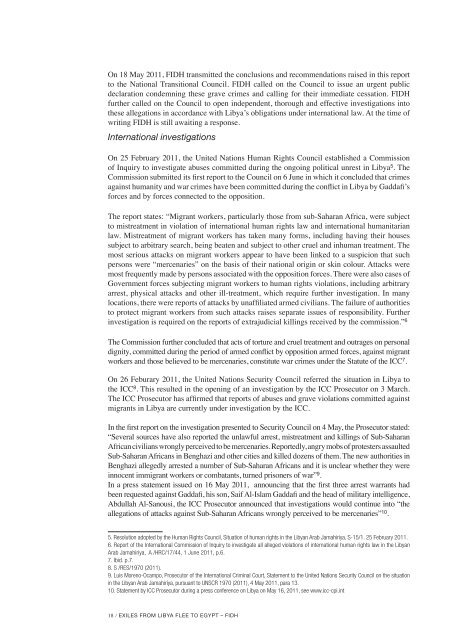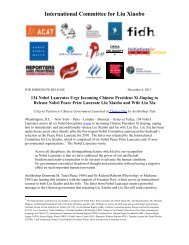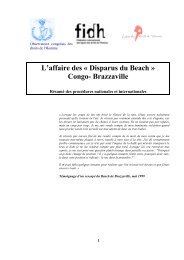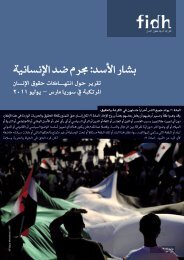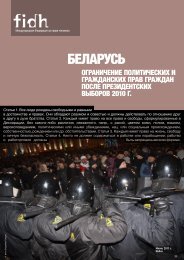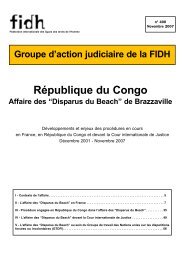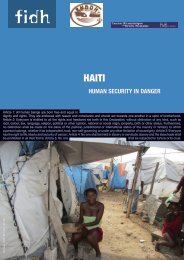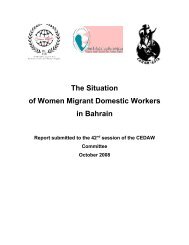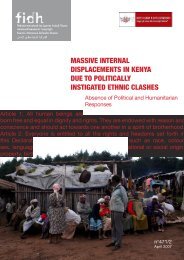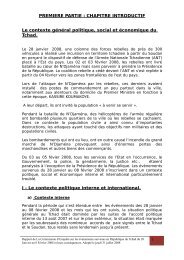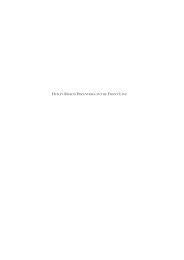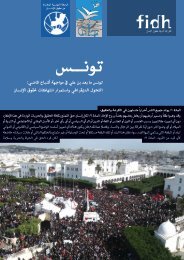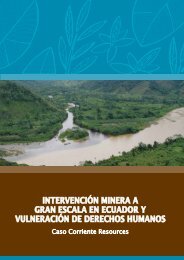Create successful ePaper yourself
Turn your PDF publications into a flip-book with our unique Google optimized e-Paper software.
On 18 May 2011, <strong>FIDH</strong> transmitted the conclusions and recommendations raised in this report<strong>to</strong> the National Transitional Council. <strong>FIDH</strong> called on the Council <strong>to</strong> issue an urgent publicdeclaration condemning these grave crimes and calling for their immediate cessation. <strong>FIDH</strong>further called on the Council <strong>to</strong> open independent, thorough and effective investigations in<strong>to</strong>these allegations in accordance with <strong>Libya</strong>’s obligations under international law. At the time ofwriting <strong>FIDH</strong> is still awaiting a response.International investigationsOn 25 February 2011, the United Nations Human Rights Council established a Commissionof Inquiry <strong>to</strong> investigate abuses committed during the ongoing political unrest in <strong>Libya</strong> 5 . TheCommission submitted its first report <strong>to</strong> the Council on 6 June in which it concluded that crimesagainst humanity and war crimes have been committed during the conflict in <strong>Libya</strong> by Gaddafi’sforces and by forces connected <strong>to</strong> the opposition.The report states: “Migrant workers, particularly those <strong>from</strong> sub-Saharan Africa, were subject<strong>to</strong> mistreatment in violation of international human rights law and international humanitarianlaw. Mistreatment of migrant workers has taken many forms, including having their housessubject <strong>to</strong> arbitrary search, being beaten and subject <strong>to</strong> other cruel and inhuman treatment. Themost serious attacks on migrant workers appear <strong>to</strong> have been linked <strong>to</strong> a suspicion that suchpersons were “mercenaries” on the basis of their national origin or skin colour. Attacks weremost frequently made by persons associated with the opposition forces. There were also cases ofGovernment forces subjecting migrant workers <strong>to</strong> human rights violations, including arbitraryarrest, physical attacks and other ill-treatment, which require further investigation. In manylocations, there were reports of attacks by unaffiliated armed civilians. The failure of authorities<strong>to</strong> protect migrant workers <strong>from</strong> such attacks raises separate issues of responsibility. Furtherinvestigation is required on the reports of extrajudicial killings received by the commission.” 6The Commission further concluded that acts of <strong>to</strong>rture and cruel treatment and outrages on personaldignity, committed during the period of armed conflict by opposition armed forces, against migrantworkers and those believed <strong>to</strong> be mercenaries, constitute war crimes under the Statute of the ICC 7 .On 26 Feburary 2011, the United Nations Security Council referred the situation in <strong>Libya</strong> <strong>to</strong>the ICC 8 . This resulted in the opening of an investigation by the ICC Prosecu<strong>to</strong>r on 3 March.The ICC Prosecu<strong>to</strong>r has affirmed that reports of abuses and grave violations committed againstmigrants in <strong>Libya</strong> are currently under investigation by the ICC.In the first report on the investigation presented <strong>to</strong> Security Council on 4 May, the Prosecu<strong>to</strong>r stated:“Several sources have also reported the unlawful arrest, mistreatment and killings of Sub-SaharanAfrican civilians wrongly perceived <strong>to</strong> be mercenaries. <strong>Report</strong>edly, angry mobs of protesters assaultedSub-Saharan Africans in Benghazi and other cities and killed dozens of them. The new authorities inBenghazi allegedly arrested a number of Sub-Saharan Africans and it is unclear whether they wereinnocent immigrant workers or combatants, turned prisoners of war” 9 .In a press statement issued on 16 May 2011, announcing that the first three arrest warrants hadbeen requested against Gaddafi, his son, Saif Al-Islam Gaddafi and the head of military intelligence,Abdullah Al-Sanousi, the ICC Prosecu<strong>to</strong>r announced that investigations would continue in<strong>to</strong> “theallegations of attacks against Sub-Saharan Africans wrongly perceived <strong>to</strong> be mercenaries” 10 .5. Resolution adopted by the Human Rights Council, Situation of human rights in the <strong>Libya</strong>n Arab Jamahiriya, S-15/1. 25 February 2011.6. <strong>Report</strong> of the International Commission of Inquiry <strong>to</strong> investigate all alleged violations of international human rights law in the <strong>Libya</strong>nArab Jamahiriya, A /HRC/17/44, 1 June 2011, p.6.7. Ibid. p.7.8. S /RES/1970 (2011).9. Luis Moreno-Ocampo, Prosecu<strong>to</strong>r of the International Criminal Court, Statement <strong>to</strong> the United Nations Security Council on the situationin the <strong>Libya</strong>n Arab Jamahiriya, pursuant <strong>to</strong> UNSCR 1970 (2011), 4 May 2011, para 13.10. Statement by ICC Prosecu<strong>to</strong>r during a press conference on <strong>Libya</strong> on May 16, 2011, see www.icc-cpi.int18 / EXILES FROM LIBYA FLEE TO EGYPT – <strong>FIDH</strong>


